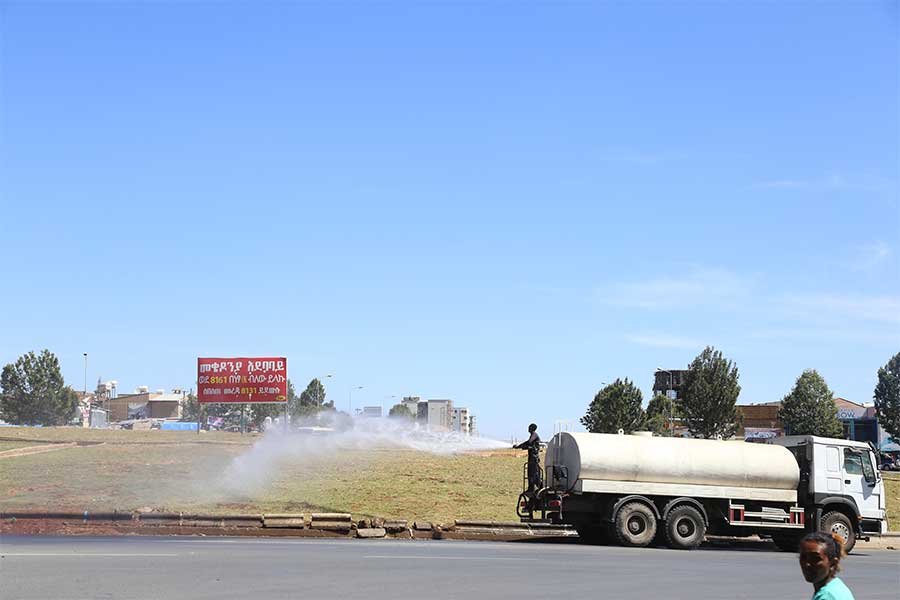
Fortune News | Jun 19,2021
The Ethiopia Water Technology Institute is constructing a specialised laboratory for water testing and research at the cost of 145 million Br. The lab, which reached 80pc completion, is fully funded by the government and will be the first of its kind in the country.
The lab will test the quality of water for drinking, irrigation, agro-processing, and tourism and recreation. The testing is conducted to measure the content of the water and determine safety and suitability for its intended utilisation in line with the standards set by the World Health Organisation (WHO).
The specialised laboratory will have facilities for chemical, bacteriological, radioactive, and water construction materials testing, as well as training rooms for staff. The two-storey laboratory, which lies on 1,770Sqm of land in the Aqaki Qality District, is expected to be operational in February.
Bereket Endeshaw Building Contractor was hired in 2018 to construct the facility with the supervision of the Ethiopian Construction Design & Supervision Works Corporation.
The establishment of the lab aims to minimise all water quality-related risks by identifying the gaps of other laboratories, according to Wasihun Alemayehu, communications head at the Institute, which was first formed in 1997 as the Ethiopian Water Technology Education Centre with the technical assistance of the Japan International Cooperation Agency and re-established eight years ago.
The country lacks specialised water testing laboratories and has been forced to spend foreign currency sending water samples abroad for testing, according to Abebe Guluma, laboratory director at the Institute that conducts research and studies the adverse effects of industries, treated-sewage, bio-chemicals, pesticides, compost, climate change, and water-treatment on the quality of the country's water resources.
“This has necessitated embarking on the project,” Abebe said.
In addition to the foreign currency expenditure, results take a long time to arrive, according to Abebe.
The lab will enable public and private institutions to conduct testing at its facilities without payment if they can supply the chemicals and reagents needed to carry out the testing.
To confirm quality and certify the products of water bottlers, the Ethiopian Conformity Assessment Enterprise conducts chemical, micro-biological, and radiation evaluation that assesses the mineral content, microbial contamination, and the amount of radiation in the water, respectively.
It conducts its evaluation based on 55 parameters, out of which 21 elements that relate to heavy metal contents and pesticide residuals in the water need to be sent abroad for testing.
Residual pesticide and chromatography tests have been sent abroad since the existing local facilities have shortages in human resources, machinery and standards, according to Markos Alemayehu, a consultant at Best Water who has been consulting for Yes, Arki and Wow water companies.
"The establishment of the specialised lab may solve these problems," he said. "But the lab has to have a third-party certificate for its data or testing to be reliable."
As the economy grows and industries expand, climate change trends and water pollution have become challenging problems in both urban and rural areas, according to Abubaker Yilma (PhD), an associate professor of chemical & bio-engineering at Addis Abeba University.
"To deal with the problem, the country has to have advanced water testing laboratories," said the expert.
He explained that there is a critical shortage of such laboratories, save for a few labs located in universities whose functions are few and inefficient. There is a need for water standards and conformity to tackle water-borne problems, according to Abubaker. He adds that the national quality infrastructure of the country has limited capability.
"In addition to the infrastructure [laboratory], the Institute needs sufficient and skilled manpower to operate the lab, and there should be regular calibrations," said Abubaker.
The Institute is also building a new facility for irrigation and water management training at the cost of 130 million Br. Sprawling over a 2,640Sqm plot at a place in front of the head office of the Addis Abeba Light Rail Transit, the centre will have an enrollment capacity of 150 trainers and 1,000 trainees. It is located in Aqaqi Qality District inside the premises of the Ethiopian Water Technology Institute and has reached 98pc of completion.
King Mohammed VI Foundation for Sustainable Development financed the building of the training centre that kicked off in July 2018. The project was awarded to Seprob, a Moroccan company that later outsourced it to Bamacon Engineering. My Consulting Architects & Engineering is supervising the project.
PUBLISHED ON
Nov 07,2020 [ VOL
21 , NO
1071]

Fortune News | Jun 19,2021

Radar | Jan 11,2020

Commentaries | Mar 18,2023

Radar | Jan 25,2020

Radar | Jul 27,2019

Fortune News | May 23,2020

Fortune News | Sep 11,2020

Radar |

Radar | Oct 05,2019

Viewpoints | Oct 11,2025

Dec 22 , 2024 . By TIZITA SHEWAFERAW
Charged with transforming colossal state-owned enterprises into modern and competitiv...

Aug 18 , 2024 . By AKSAH ITALO
Although predictable Yonas Zerihun's job in the ride-hailing service is not immune to...

Jul 28 , 2024 . By TIZITA SHEWAFERAW
Unhabitual, perhaps too many, Samuel Gebreyohannes, 38, used to occasionally enjoy a couple of beers at breakfast. However, he recently swit...

Jul 13 , 2024 . By AKSAH ITALO
Investors who rely on tractors, trucks, and field vehicles for commuting, transporting commodities, and f...

Oct 11 , 2025
Ladislas Farago, a roving Associated Press (AP) correspondent, arrived in Ethiopia in...

Oct 4 , 2025
Eyob Tekalegn (PhD) had been in the Governor's chair for only weeks when, on Septembe...

Sep 27 , 2025
Four years into an experiment with “shock therapy” in education, the national moo...

Sep 20 , 2025
Getachew Reda's return to the national stage was always going to stir attention. Once...